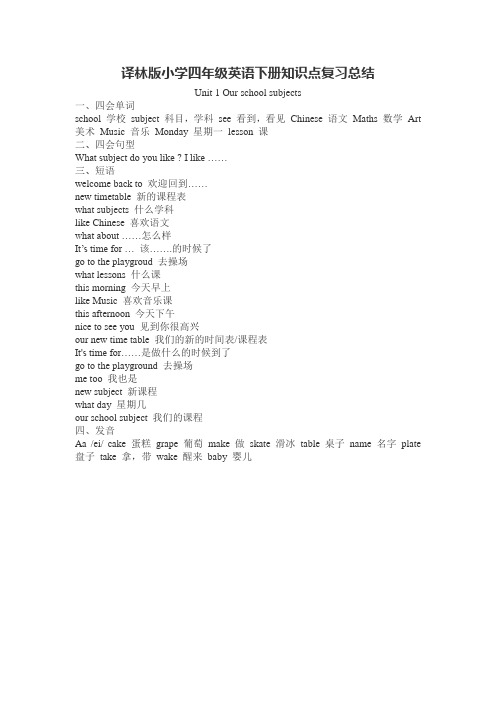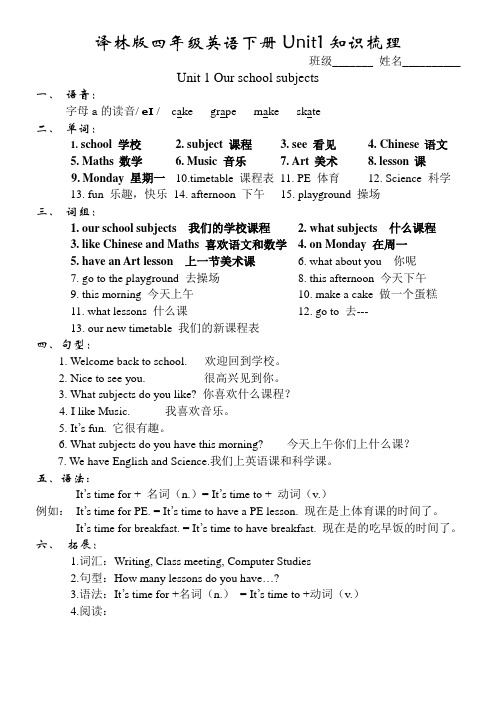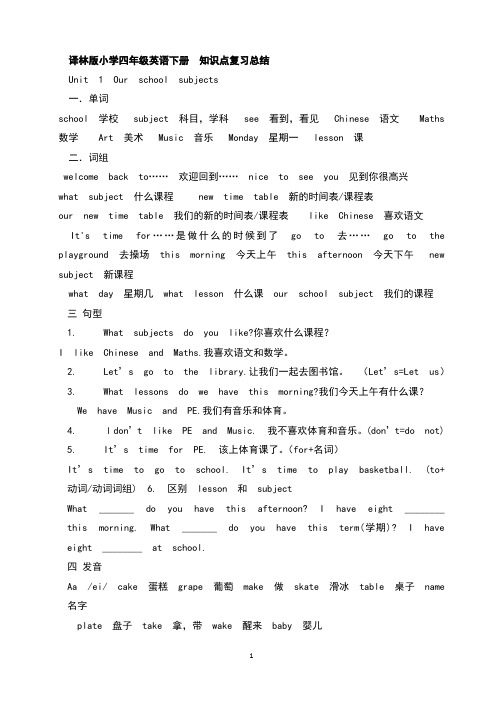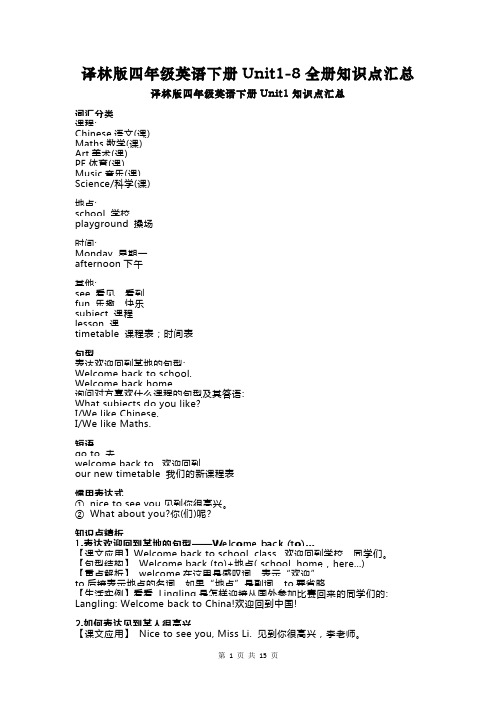(完整版)译林英语四年级下unit1单词词组知识点.(最新整理)
苏教译林版英语四年级下册Unit 1知识梳理

苏教译林版英语四年级下册Unit 1知识梳理一、重点词组our school subjects 我们的学校课程our new timetable 我们的新课程表w elcome back to…欢迎回到…what subjects 什么学科like Chinese 喜欢语文what lessons 什么课go to the playground 去操场what about ……怎么样this morning 今天上午make a cake 做一个蛋糕have eight subjects 有八门课程have eight lessons 有八节课on Monday 在周一an English lesson 一节英语课二、重点句型1. Welcome back to school/ Suzhou. 欢迎回到学校/苏州。
2. Nice to see you. 见到你很高兴。
Nice to see you too. 我也很高兴见到你。
3. What subjects do you have/like? 你(们)有/喜欢什么课程?I have/like English and PE. 我有/喜欢英语和体育课。
4. What lessons do we have this morning/afternoon? 今天上午/下午我们有什么课?We have Chinese, Maths and English. 我们有语文、数学和英语。
5. I like English. It’s fun.我喜欢英语。
它有趣。
6. Let’s go to the playground. 让我们去操场吧。
7. It’s Monday. (今天)星期一。
8. But I don’t like that. 但是我不喜欢那个。
9. Come and make a cake. 来制作一个蛋糕。
10. They like Music.他们喜欢音乐。
译林英语四年级下知识点和语法汇总

译林版小学英语四年级下册知识要点Unit1 Our school subjects词汇 school subject see Chinese Maths Art Music lesson Monday PE Science fun go to playground afternoon句型 What subject do you like? 你喜欢什么科目I like English. How about you? 我喜欢英语。
那你呢I like Science. 我喜欢科学。
Welcome back to school. 欢迎回到学校。
What lessons do you have in the afternoon? 你们下午有什么课Unit2 After school词汇 Wednesday Saturday Sunday Tuesday Thursday Friday get up起床after school 放学后 go match today whenevery day每天句型 I have…我有……He/She has…他/她有……We don’t have…我们没有……What day is it today? 今天星期几It’s Monday. 今天星期一。
What a pity! 真遗憾!All right. 好的。
Unit3 My day词汇 usually经常 go to school 去上学 in the morning 在上午in the afternoon在下午go home 回家 homework watch TV 看电视in the evening在晚上have lunch 吃中饭 have dinner 吃晚饭 go to bed 睡觉at night在夜里句型 when do you go to bed? 你什么时间睡觉I go to bed at nine. 我9点睡觉Unit4 Drawing in the park词汇 park draw flower them boat river lakedrawing easy difficult try hill again句型 what can you see? 你能看到什么I can …我能……Good idea! 好主意!Unit5 Seasons词汇seasons spring warm summer hot autumn cool winter cold fly kite放风筝 go boating 去划船 go swimming 去游泳 picnic goclimbing 去爬山 go skating 去滑冰 fine whose句型 in spring,it is warm 在春天里,它是暖和的。
(完整版)译林版小学四年级英语下册知识点复习总结

译林版小学四年级英语下册知识点复习总结Unit 1 Our school subjects一、四会单词school 学校subject 科目,学科see 看到,看见Chinese 语文Maths 数学Art 美术Music 音乐Monday 星期一lesson 课二、四会句型What subject do you like ? I like ……三、短语welcome back to 欢迎回到……new timetable 新的课程表what subjects 什么学科like Chinese 喜欢语文what about ……怎么样It’s time for … 该…….的时候了go to the playgroud 去操场what lessons 什么课this morning 今天早上like Music 喜欢音乐课this afternoon 今天下午nice to see you 见到你很高兴our new time table 我们的新的时间表/课程表It's time for……是做什么的时候到了go to the playground 去操场me too 我也是new subject 新课程what day 星期几our school subject 我们的课程四、发音Aa /ei/ cake 蛋糕grape 葡萄make 做skate 滑冰table 桌子name 名字plate 盘子take 拿,带wake 醒来baby 婴儿Unit 2 After school一、四会单词Monday 星期一Tuesday 星期二Wednesday 星期三Thursday 星期三Friday 星期五Saturday 星期六Sunday 星期日get up 起床二、四会句型1.What day is it today ? It’s ……2.What lessons do you have on ……?I have ……3.We don’t have any lessons …4.When do you get up …? I get up at ….三、、短语play table tennis 打乒乓球what day 星期几a football match 一场足球比赛a swimming lesson 一节游泳课all right 好的get up 起床good morning 早上好every day 每天at five 在五点钟what lessons 什么课on Saturday 在星期六play table tennis 打乒乓球what day is it today? 今天星期几?come and play table tennis 来打乒乓球what a pity 真遗憾at school 在学校after school 放学后四、发音Aa / æ / bag书包cap 帽子hamburger 汉堡包sandwich 三明治snack 快餐dad 爸爸Maths 数学match 比赛Saturday 星期六apple 苹果Unit 3 My day一、四会单词usually 通常常常homework 家庭作业二、四会句型When do you get up …I get up …at six /…三、短语go to school 上学at seven forty 在七点四十分in the morning 在早上have lunch 吃午饭in the afternoon 在下午do my homework 做家庭作业have dinner 吃晚饭every day 每天what time 什么时间over there 在那边a big cake 一块大蛋糕like cakes 喜欢蛋糕my day 我的一天four lessons 四节课five subjects 四门课程at seven 在七点watch TV 看电视go to bed 睡觉play football 踢足球in the evening 在晚上at night 在夜里四、发音E e / i: / me 我she 她green 睡觉sleep 睡觉three 三week 星期,周see 看到meet 遇见evening 晚上Unit 4 Drawing in the park一、四会单词park 公园draw 画flower 花them 他们,她们,它们boat 小船river 河,江lake 湖,湖泊二、四会句型What can you do ?I can draw /make a cake /… Good night.三、短语draw some pictures 画一些画good idea 好主意over there 那边some flowers 一些花draw them 画它们on the river 在河面上this big box 这只大盒子have a look 看一看on the lake 在湖面上try again 再试一试in the park 在公园里some pictures 一些图画well done 好样的,干得好can you draw 你会画吗?in the boat 在小船里drawing in the park 在公园里画画a tree 一棵树five trees 五棵树on the hill 在小山上see a boat 看到一条小船make a cake 做一个蛋糕before ten 十点之前四、发音e / e / bed 床desk 课桌,书桌pen 钢笔red 红色的ten 十friend 朋友them 他们pencil 铅笔Wednesday 星期三welcome 欢迎Unit 5 Seasons一、四会单词season 季节spring 春天,春季warm 温暖summer 夏天hot 热的,炎热的autumn 秋天,秋季cool 凉爽的,凉快的winter 冬天,冬季cold 冷的二、四会句型It is spring / summer / autumn / winter It is … I go … I like …三、短语in spring 在春天fly kites 放风筝go boating 去划船in summer 在夏天eat ice cream 吃冰激凌go swimming 去游泳in autumn在秋天have picnics 举行野餐go climbing 去爬山in winter 在冬天make snowmen 堆雪人go skating 去滑冰a fine day 晴朗的一天your jacket 你的夹克衫your bag 你的包whose bag 谁的包look at 看…….my dress 我的连衣裙too short 太短了your trousers 你的裤子too long 太长了go to the party 去参加聚会so big 真大whose gloves 谁的手套my father’s 我爸爸的whose dress 谁的连衣裙so beautiful 真漂亮can move 能移动my hand 我的手four seasons四个季节like spring喜欢春天in autumn在秋天a fine day一个晴朗的日子a sunny day一个晴朗的日子very cold非常冷here’s your jacket这儿有你的夹克衫all like the kite都喜欢这个风筝四、发音i / ai / Chinese 语文kite 喜欢like 喜欢time 时间white 白色的fine 晴朗的climb 爬like 喜欢lion 狮子rice 米饭Unit 6 Whose dress is this ?一、四会单词dress 连衣裙party 聚会coat 外衣,外套shirt (男士)衬衫sweater 毛衣hand 手二、四会句型1.Whose … is this / that ? It’s my father’s…2.Whose … are these / those ? They’re my father’s…3.I think so . What’s the matter?三、短语whose dress谁的连衣裙look at my sweater看我的毛衣try this试试这个your long trousers你的长裤try these试试这些all right好的let’s go to the party让我们去参加聚会look at Su Yang’s gloves看苏阳的手套so big如此大my father’s coat我爸爸的上衣my cousin’s dress我堂姐的连衣裙so beautiful如此美丽you’re wrong你错了you’re right你对了can move能动what’s the matter怎么了I think so我认为是这样let’s play让我们玩吧before eating fish在吃鱼之前listen to some English听一些英语eat my cake by the lake在湖边吃我的蛋糕read and write读和写四、发音i / i / English 英语fish 鱼him 他(宾格)music 音乐pig 猪sixteen 十六listen 听picture 野餐difficult 困难的Unit7 What’s the matter?一、四会单词bad 爸爸water 水ill 生病tired 累的,疲劳的happy 快乐的,高兴的speak 说话,讲话Mrs 夫人,太太二、四会句型1.What’s the matter ? I’m … Here’s some /a …for you. Thank you .2. Good night .三、短语have a pie 吃个馅饼have some water 喝些水go to bed 睡觉good night 晚安all right 好的have a cake 吃块蛋糕what’s the matter怎么了come and have a pie来吃一个馅饼I’m not hungry我不饿have some water喝一些水here you are给你I’m tired我累了want to go to bed想去睡觉good night晚安Mum and Dad妈妈和爸爸I’m thirsty我渴了here’s some wate r这里有水have a cake吃一个蛋糕go home回家show Rose your nose给罗斯看你的鼻子take this pill吃这片药here’s a fan这儿有一把扇子have some water喝一些水here’s a hot dog吃一个热狗talk about feelings谈论感觉四、发音O / / close 关home 家no 不nose 鼻子open 打开go 去cold 冷的old 老的only 仅仅boat 船Unit 8 How are you ?一、四会单词may 可以hear 听到,听见take care 保重at school 在学校二、四会句型1. This is …speaking . May I speak to … ,please .2. I’m sorry to hear that .3. How are you ? Not so good . I have a cold / cough三、、短语speak to 与……交谈come to school 来学校have a cold 感冒take care 保重see you tomorrow 明天见see you 再见at school 在学校have lessons 有课上课on Sunday 在星期日how are you你好吗this is Yang Ling speaking我是杨玲(电话用语)speak to Miss Li和李老师通话can’t come to school today今天不能来学校have a cold and fever感冒又发烧I’m sorry to hear that听到这事我很难过have a headache头疼not so good不太好have a cough咳嗽don’t have any lessons on Sunday在星期天不上课the hot dog in the box在盒子里的热狗go and see Doctor Wu去看吴医生see you after school放学后再见have a cough and a headache咳嗽又头疼talk about some illness谈论一些疾病make a telephone call打个电话四、发音O / / coffee 咖啡dog 狗hot 热not 不是sock 袜子box 盒子long 长的orange 橙子sorry 对不起clock 钟。
译林版四下U1知识点整理归纳

Unit1Our school subjects(注意:A本抄写划线部分的,B本默写都要默)⼀一、单词:subject课程、学科lesson课back背部;后⾯面English英语(课)Science科学(课)Chinese语⽂文(课)Maths数学(课)Art美术(课)PE体育(课)Music⾳音乐(课)school学校playground操场Monday星期⼀一welcome欢迎fun乐趣,快乐timetable课程表;时间表⼆二、词组:1.our school subjects我们的学校课程2.back to school回到学校3.our new timetable我们的新课程表4.like Chinese and Maths喜欢语⽂文和数学5.go to the playground去操场6.this morning/afternoon今天早上/下午7.have PE and Science上体育和科学课8.at school在学校e and make a cake来做个蛋糕10.all like English都喜欢英语11.some school subjects⼀一些学校课程12.welcome to Nanjing欢迎来到南京三、句句⼦子:1.Welcome back to school,class.同学们,欢迎返校。
2.What lessons do we have this morning/this afternoon?我们今天上午/下午有哪些课?3.We have English,Chinese Maths,PE and Science.我们有英语课,语⽂文课,数学课,体育课以及科学课。
知识点:并列列的词语:2个A and B3个及以上A,B,C and D4.What subjects do you like?I like Music.你喜欢什什么科⽬目?我喜欢⾳音乐。
译林版小学英语四年级下册单元知识归纳

译林版小学英语4B四年级下册1-2单元知识归纳Unit 1 Our school subjects知识点一.语音Kate, Kate, don’t skate. Come and make a cake.二.词汇(三会是会读,四会是会默写)词组:1. our school subjects 我们的学校课程2. welcome back to school 欢迎回到学校3. see you 见到你4. our new timetable 我们的新课程表5. Music and Science 音乐和科学6. what subjects 什么课程7. Chinese and Maths 语文和数学8. like English 喜欢英语9. go to the playground 去操场10. what about... ...怎么样11. English and Art 英语和美术12. what lessons 什么课13. have Music and Maths 有音乐课和数学课14. this morning 今天早上15. this afternoon 今天下午16. have PE and Science 有体育课和科学课17. like PE 喜欢体育课18. make a cake 做一个蛋糕19. all like English 都喜欢英语20. at school 在学校21. on Monday morning 在周一上午三、句型(会读背,知道意思)1. Welcome back to school, class. 欢迎回到学校,同学们。
2. Nice to see you. 很高兴见到你。
3. This is our new timetable. 这是我们的新课程表。
4. What subjects do you like 你喜欢什么课程5. I like Chinese and Maths. 我喜欢语文课和数学课。
译林版四年级英语下册unit1~unit8知识点.doc

13.cold冷的,寒冷的14.fine晴朗的15.hey嘿,喂16.whose谁的
17.sunny晴朗的18.each每;每个
词组:(带*的表示知道意思,能看懂即可,有余力的可以写一写)
1.four seasons四个季节2.in spring在春天3.fly kites放风筝
15.have breakfast吃早饭16.over there在那边
19.daily activities日常活动*20.meet Miss Li at three在三点见李老师
句子:
1.When do you get up/go to school/have lunch...?你什么时候起床/上学/吃午饭...?
译林版4B四年级英语下册英语复习知识点
Unit1 Our school subjects
单词:
1.school学校2.subject课程3.back背部;后面4.see看见,看到
5.timetable课程表;时间表6.English英语(课)7.Chinese语文(课)
8.Maths数学(课)9.Art美术(课)10.PE体育(课)11.Music音乐(课)
2.Nice to meet you. Nice to meet you too.很高兴认识你(初次见面)。
3.We have English, Chinese...and Science.我们有英语课,语文课...以及科学课。
并列的词语:2个A and B例如:English and Maths
3个及以上A,B,C and D例如: English, Maths, Chinese and PE
译林英语四下 Unit 1 单元知识点整理

四下Unit 1 单元知识1.学校2. 课程,科目3. 看见,看到4.语文(课)5. 数学(课)6. 美术(课)7. 音乐(课) 8. 课9. 星期一1.欢迎回到…2. 课程表,时间表2.体育(课)4. 科学(课) 5.乐趣,快乐 6. 去…… 7. 操场8. 下午1. 我们的学校课程2. 见到你3. 语文和数学4. 喜欢英语5. 什么课程(指学科)6. 什么课(指课)7. 喜欢英语8. 美术和音乐9. 有音乐课和数学课10. 我的学校课程1. 回到学校2. 我们的新课程表3. 音乐和科学4. 去操场5. 今天早上6. 今天下午7. 喜欢体育课8. 不喜欢那个9. 不要滑冰10. 做一个蛋糕11. 在学校12. 欢迎回到...1.见到你也很高兴。
2.你喜欢什么课程?我喜欢语文课和数学课。
3. 该是上体育课的时间了。
4. 今天上午我们有什么课?我们有音乐课和数学课。
5. 今天下午我们有什么课?1.欢迎回到学校,同学们。
2.这是我们的新课程表。
3.我们有英语课、语文课、数学课、美术课、体育课、音乐课和科学课。
4. 它很有趣。
5. 让我们去操场吧。
(Let’s=Let us)6. 但是我不喜欢那个。
(don’t=do not)7. 过来制作一个蛋糕。
8. 音乐课,音乐课,他们喜欢音乐课。
a /eɪ / cake grape make skate Kate timetable name table语言点1. It’s time for school. (for+名词)It’s time to go to school. It’s time to play basketball. (to+动词)2.注意区别what subjects 和what lessons。
What subjects讲的是课程、科目、学科,如What subjects do you like? 你喜欢什么学科?而what lessons讲的是每天要上的课,如What lessons do you have this morning? 今天上午你们有些什么课?What _______ do you have this afternoon? I have eight ________ this morning. What _______ do you have this term(学期)? I have eight ________ at school.。
牛津译林版四年级英语下册第一单元知识点

牛津译林版四年级英语下册第一单元知识点Unit1 知识点一、词汇:school学校 subject课程 see看见 Chinese 语文(课)Maths数学(课) Art美术(课) Music 音乐(课)lesson课 Monday星期一二、词组:1.our new timetable我们的新课表2.like Chinese 喜欢语文3.like Maths喜欢数学4.like English喜欢英语5.go to the playground去操场6.what lessons什么课7.what subjects 什么课程 8.this morning今天早上9.this afternoon今天下午 10.don’t skate不滑冰11.make a cake做一个蛋糕 e and make a cake过来做一个蛋糕13.our school subjects 我们的学校课程 14.at school 在学校三、句子:1.Welcome back to school. 欢迎回校。
2.Nice to see you. 见到你很高兴。
3.What about you? 你呢?4.It’s fun. 有趣。
5.It’s time for PE. 该上体育课了。
6.A:What subjects do you like? 你喜欢什么科目?B:I like Art and Music.我喜欢美术和音乐。
7.A:What lessons do we have this morning?我们上午有什么课?B:We have English、Chinese、and Maths.我们有英语、语文和数学。
8.A:What lessons do you have this afternoon?我们下午有什么课?B:We have PE、Art、and Music.我们有体育、美术和音乐。
9.Kate,Kate,don’t skate. Come and make a cake.凯特,凯特,不要溜冰。
新译林版(三起)英语四年级下册全册知识点归纳

四军级下册英语知识点梳理(译林版三起)Unit 1-、重点单词school学校subject课程Chinese 语文(课)Maths数学Music盲乐(课)lesson课Monday星期一二、重点短语1.our school subjects2.like Chinese and Maths3.this morning4.this afternoon5.have lessons三、重点旬子1.Welcome back to school.2.Nice to meet you.3.What subjects do you like?4.I like Chinese and Maths.我们的学校课程喜欢语文和数学今天旱上今天下午上课欢迎回到学校。
很高兴见到你们。
你喜欢什么科目?我喜欢语文相数学。
5.What lessons do we have this morning?今天上午我们上什么课。
6.We have Music and Maths.我们上音乐和数学。
四、旬型结相对”你喜欢什么科目”的句型表达及回答:一What subjects do you like?…I like ...Unit 2Wednesday星期三Saturday星期六Sunday星期天Tuesday星期二Friday星期五get up起床二、重点短语1.a football match2.play table tennis3.a swimming lesson4.on Saturday5.get up三、重点旬子一场足球比赛打乒乓球一节游泳课在周六起床1.What day is it today?今天星期几?2.It’s Wednesday.今天星期三。
3.1 have a swimming lesson.我奇一节游泳课。
4.We don’t have any lessons on Saturday.我们周六没萄课。
5.What a pity !多么遗憾啊!6.AII right.好的。
译林版四年级英语下册Unit1知识梳理-最新

译林版四年级英语下册Unit1知识梳理班级_______ 姓名__________Unit 1 Our school subjects一、语音:字母a的读音/ eI/ cake grape make skate二、单词:1.school 学校2. subject 课程3. see 看见4. Chinese语文5. Maths数学6.Music 音乐7.Art美术8.lesson课9.Monday 星期一10.timetable 课程表11. PE 体育12. Science 科学13. fun 乐趣,快乐14. afternoon 下午15. playground 操场三、词组:1. our school subjects 我们的学校课程2. what subjects 什么课程3. like Chinese and Maths 喜欢语文和数学4. on Monday 在周一5. have an Art lesson 上一节美术课6. what about you 你呢7. go to the playground 去操场 8. this afternoon 今天下午9. this morning 今天上午10. make a cake 做一个蛋糕11. what lessons 什么课12. go to 去---13. our new timetable 我们的新课程表四、句型:1. Welcome back to school. 欢迎回到学校。
2. Nice to see you. 很高兴见到你。
3. What subjects do you like? 你喜欢什么课程?4. I like Music. 我喜欢音乐。
5. It’s fun. 它很有趣。
6. What subjects do you have this morning? 今天上午你们上什么课?7. We have English and Science.我们上英语课和科学课。
(完整版)译林版四年级下册知识点

译林版小学四年级英语下册知识点复习总结Unit 1 Our school subjects一.单词school 学校 subject 科目,学科see 看到,看见Chinese 语文Maths 数学 Art 美术Music 音乐 Monday 星期一 lesson 课二.词组welcome back to……欢迎回到……nice to see you 见到你很高兴what subject 什么课程 new time table 新的时间表/课程表our new time table 我们的新的时间表/课程表 like Chinese 喜欢语文It's time for……是做什么的时候到了go to去……go to the playground 去操场this morning 今天上午this afternoon 今天下午 new subject 新课程what day 星期几what lesson 什么课our school subject 我们的课程三句型1.What subjects do you like?你喜欢什么课程?I like Chinese and Maths.我喜欢语文和数学。
2.Let’s go to the library.让我们一起去图书馆。
(Let’s=Let us)3.What lessons do we have this morning?我们今天上午有什么课?We have Music and PE.我们有音乐和体育。
4.Idon’t like PE and Music. 我不喜欢体育和音乐。
(don’t=do not)5.It’s time for PE. 该上体育课了。
(for+名词)It’s time to go to school. It’s time to play basketball. (to+动词/动词词组) 6. 区别lesson 和subjectWhat _______ do you have this afternoon? I have eight ________ this morning. What _______ do you have this term(学期)? I have eight ________ at school.四发音Aa /ei/ cake 蛋糕grape 葡萄make 做skate 滑冰table 桌子name 名字plate 盘子take 拿,带wake 醒来baby 婴儿五练习(一)、单项选择。
【译林版】四下Unit 1 Our school subjects 知识点梳理

四下Unit 1 Our school subjects 知识点梳理1.学科名称美术课 Art 语文课 Chinese 英语课 English数学课 Maths 音乐课 Music 体育课 PE科学课 Science一节体育课 a PE lesson 一节音乐课 a Music lesson一节美术课 an Art lesson 一节游泳课 a swimming lesson 2.欢迎回到……Welcome back to…欢迎回到学校。
Welcome back to school.欢迎回家。
Welcome back home.3.很高兴见到你。
Nice to see you.Nice to see you.用于认识的人之间,它的回答是:Nice to see you too.而Nice to meet you.用于初次见面的人之间,要进行区分。
4.询问对方喜欢什么学科/科目你喜欢什么学科? What subjects do you like?我喜欢…… I like …5.区分subject 和 lessonSubject指学科,科目,一般用于询问喜欢的科目或长时间内上的科目,如What subjects do you like?或 What subjects do you have this term?Lesson指课,一般同于询问短时间内上几节课或什么课,如:How manylessons do you have today?或 What lessons do you have this morning?6.该……了,是……的时候了I t’s time for + 名词. = It’s time to + 动词词组 .例句:该上体育课了。
It’s time for PE. = It’s time to have a PE lesson.该吃早饭了。
It’s time for breakfast. = It’s time to have breakfast.该踢足球了。
译林版四年级英语下册Unit 1-Unit8知识点汇总

译林版四年级英语下册Unit 1知识点汇总单词school 学校subject 课程Welcome back to …欢迎回到……see 看见,看到timetable 课程表,时间表Chinese 语文(课) Maths 数学(课)Art 美术(课)PE 体育(课)Music 音乐(课)Science 科学(课)fun 乐趣,快乐go to 去……. playground 操场lesson 课Monday 星期一afternoon 下午重点内容词汇分类课程:Chinese语文(课) Maths数学(课) Art美术(课)PE体育(课) Music音乐(课) Science/科学(课) 地点:school 学校playground 操场时间:Monday 星期一afternoon下午其他:see 看见,看到fun 乐趣,快乐subject 课程lesson 课timetable 课程表;时间表句型表达欢迎回到某地的句型:Welcome back to school. Welcome back home.询问对方喜欢什么课程的句型及其答语: What subjects do you like?I/We like Chinese.I/We like Maths.短语go to 去…welcome back to…欢迎回到…our new timetable 我们的新课程表惯用表达式①nice to see you.见到你很高兴。
②What about you?你(们)呢?知识点精析1.表达欢迎回到某地的句型——Welcome back (to)…【课文应用】Welcome back to school, class. 欢迎回到学校,同学们。
【句型结构】Welcome back (to)+地点( school, home,here...)【重点解析】welcome在这里是感叹词,表示“欢迎”to后接表示地点的名词,如果“地点”是副词,to要省略。
译林版英语四年级下册_Unit1-8_知识点梳理

四年级英语下册知识点梳理Unit1 Our school subjects一、重点词组:1. our new timetable 我们的新课表2. an Art lesson 一节美术课3. like Chinese / Maths /English 喜欢语文/数学/英语4. what subjects 什么课程(科目)5. go to the playground 去操场6. what lessons 什么课7. this morning /afternoon /evening 今天早上/下午/晚上8. at school 在学校二、重点句型:1. Welcome back to school. 欢迎回到学校。
2. Nice to see you. 见到你很高兴。
3. It’s time for PE. 该上体育课了。
4. What subjects do you like? 你喜欢什么科目?5. I like Art and Music. 我喜欢美术和音乐三、重点语言知识1. 课程类单词首字母都要大写,如:A rt,C hinese,E nglish等。
2. Welcome back to school. 欢迎回到学校。
Welcome to our school. 欢迎来到我们的学校。
3. Nice to meet you. 用于陌生人首次见面打招呼用语。
Nice to see you. 用于熟人之间好久不见再次见面时打招呼用语。
4. 询问别人意见时可以说:What about you? 和How about you?的用法相近,可以替换使用。
5. 到时间该做某事;It’s time for + 名词;It’s time to + 动词。
例如:It’s time for school. =It’s time to go to school.到时间该上学了。
6. subject 表示“学科,科目”。
四年级英语译林版下册_Unit1_知识点总结

Unit1 Our school subjects一、单词our 我们的school学校subject课程,学科new新的timetable课程表playground操场lesson课come来make 做all都say说write写二、词组1. our school subjects 我们学校的课程2. w elcome (back) to… 欢迎(回)到……3. make a new timetable做一张新的课程表4. go to the playground去操场(the不能丢)5. what subjects什么课程6. what lessons什么课7. this afternoon 今天下午8. all like English都喜欢英语9. say and write the names of some school subjects说和写一些学校课程的名称10. all like都喜欢11. make a cake做一个蛋糕12. at school在学校三、句子及相关知识点1. Welcome back to school, class. 欢迎回到学校,同学们。
welcome to 欢迎来到…… welcome back to……欢迎回到……2. Nice to see you. Nice to see you too. (再次见面打招呼)Nice to meet you. Nice to meet you too. (初次见面打招呼)3. What subjects do you like? I like…你喜欢什么课程?我喜欢……subject 学科,课程lesson课如a PE lesson一节体育课补充:at a PE lesson 在一节体育课上at our English lesson 在我们的英语课上have a PE lesson有一节体育课/上一节体育课当多个东西并列时,and用于最后两个之间,如I like PE, Art, Science and Maths.4. It’s fun. 真有趣。
译林版四年级英语下册Unit1-8全册知识点汇总

译林版四年级英语下册Unit1-8全册知识点汇总译林版四年级英语下册Unit1知识点汇总词汇分类课程:Chinese语文(课)Maths数学(课)Art美术(课)PE体育(课)Music音乐(课)Science/科学(课)地点:school 学校playground 操场时间:Monday 星期一afternoon下午其他:see 看见,看到fun 乐趣,快乐subject 课程lesson 课timetable 课程表;时间表句型表达欢迎回到某地的句型:Welcome back to school.Welcome back home.询问对方喜欢什么课程的句型及其答语:What subjects do you like?I/We like Chinese.I/We like Maths.短语go to 去…welcome back to…欢迎回到…our new timetable 我们的新课程表惯用表达式①nice to see you.见到你很高兴。
②What about you?你(们)呢?知识点精析1.表达欢迎回到某地的句型——Welcome back (to)…【课文应用】Welcome back to school, class. 欢迎回到学校,同学们。
【句型结构】Welcome back (to)+地点( school, home,here...)【重点解析】welcome在这里是感叹词,表示“欢迎”to后接表示地点的名词,如果“地点”是副词,to要省略。
【生活实例】看看Lingling是怎样迎接从国外参加比赛回来的同学们的: Langling: Welcome back to China!欢迎回到中国!2.如何表达见到某人很高兴【课文应用】Nice to see you, Miss Li. 见到你很高兴,李老师。
Nice to see you too. 见到你们也很高兴。
“Nice to see you”意为“见到你(们)很高兴”,它的答语可以为“Nice to see you too.例如:一Nice to see you here,Miss Zhao. 在这里见到你很高兴,赵老师。
- 1、下载文档前请自行甄别文档内容的完整性,平台不提供额外的编辑、内容补充、找答案等附加服务。
- 2、"仅部分预览"的文档,不可在线预览部分如存在完整性等问题,可反馈申请退款(可完整预览的文档不适用该条件!)。
- 3、如文档侵犯您的权益,请联系客服反馈,我们会尽快为您处理(人工客服工作时间:9:00-18:30)。
新译林4B U1归类汇总及练习测试卷一、词组和日常用语1.our school subjects我们的学校课程2. our new timetable我们的新课程表3. what subjects 什么学科4. how many lessons多少节课5. like Science and Music喜欢科学和音乐6. an Art lesson一节美术课7. my Chinese book我的语文书8. go to the playground 去操场9 this afternoon 今天下午10. in the morning 在上午11.on Monday在星期一12. Welcome back to school. 欢迎回到学校。
13. Nice to see you. 很高兴见到你。
14. What about you?你呢?e and make a cake.过来做一个蛋糕。
16. a funny subject一门有趣的课程二、句型1. We have English, Chinese, Maths, Art, PE, Music and Science.我们有英语课、语文课、数学课、美术课、体育课、音乐课和科学课。
2. What subjects do you like? I like Chinese and Maths. Me too.你喜欢什么课程?我喜欢语文课和数学课。
我也是。
3.What subjects do you like? I like English. It’s fun. 你喜欢什么课程?我喜欢英语课。
它很有趣。
4.4. It’s time for PE. Let’s go to the playground.该是上体育课的时间了。
让我们去操场吧。
5. 5. What lessons do we have this morning? We have Music and Maths.今天上午我们有什么课?我们有音乐课和数学课。
三、语法小知识1.subject和lesson的区别subject表示“课程,科目”,lesson表示“具体的课”。
如:What subjects do you like?I like English and Maths. What lessons do you have this morning? I have English and Maths.2.It’s time for…和It’s time to…是……的时候了。
It’s timefor…后面跟名词或动名词。
It’s time to…后面跟动词原形。
It’s time for school. = It’s time to go to school. 该上学了。
It’s time for lunch.= It’s time to havelunch.吃午饭的时间到了。
It’s time for bed. =It’s time to go to bed. 是睡觉的时间了。
3.morning和afternoonthis morning 今天早上this afternoon今天下午in the morning在早上in the afternoon在下午on Monday morning 在周一早上on Monday afternoon在周一下午4. Nice to see you.和Nice to meet you. 见到你很高兴。
但用法上有区别。
Nice to meet you.用于初次见面时打招呼,应答也是Nice to meet you.而Nice to see you.用于两个认识的人见面打招呼,应答也是Nice to see you.5. subject 和lesson的区别subject是指学科,课程。
而lesson指的是具体的一节课。
它们的区别还在于lesson可接在具体科目名称后面,如a Maths lesson一节数学课an Englishlesson一节英语课。
而subject一般不与科目名称一起出现。
6.学科类的单词第一个字母要大写,如English, Chinese, Maths, Art, PE, Music, Science等。
还有一些其他的用法如:He’s an English boy. 他是一个英国男孩。
We’re Chinese. 我们是中国人。
I like listening to music.我喜欢听音乐。
7.—What day is it today? —It’s Wednesday.问“星期几”的英语表达方式:What day is it today? = What’s the day today?英语国家把“星期日”作为一个星期的第一天(“the first day of aweek。
一个星期七天的英语表达方式:Monday星期一,Tuesday星期二,Wednesday星期三,Thursday星期四,Friday星期五,Saturday 星期六,Sunday星期天。
拓展:表示在具体的“星期几”的时候,要用介词on。
介词on通常用在表示具体的某一天之前。
如:在周六on Saturday;在周六早晨on Saturday morning。
而如果没有说具体某一天的早晨,我们仍然用介词in:in the morning/ afternoon/ evening 在早上/下午/晚上。
8. I have a swimming lesson. 我有一节游泳课。
“swim”是以重读闭音节结尾的单词,后面加上“ing”时,要先双写最后一个辅音“m ”。
类似的动词有:run-running(跑、跑步, shop-shopping(购物、逛街,sit-sitting(坐,jog-jogging(慢跑, chat-chatting(闲聊、聊天,etc.。
9. Excuse me. 和I’m sorry.的区别两者都是“对不起,请原谅”的意思,但是前者用于说话做事可能会引起对方不快或要麻烦别人或请示许可等场合。
后者用于已经犯过错误,心有歉意的情况。
10、否定句:be动词(am、is、are+not、情态动词can+ not、助动词(do、does+ not如何将一个肯定的陈述句改为否定句:1、看句中有无be动词,如有,直接在be动词后+ not。
2、看句中有无情态动词,如有,直接在情态动词后+ not。
3、如上述二者都没有,就应用助动词+ not。
分四个步骤:(1肯定陈述句中本来是没有助动词的,要加上去,位置在主语(某人或某物后,动词前。
(2确定助动词用do、does,根据句中动词,动词是原形的助动词就用do,动词是第三人称单数的助动词就用does,(3在助动词后加not。
(4原句中动词假如发生变化就要恢复成原形。
强调一点,有some的要考虑是否要用any。
11、一般疑问句。
如何将一个肯定的陈述句改为一般疑问句:1、看句中有无be动词,如有,把be动词提到句首即可。
2、看句中有无情态动词,如有,把情态动词提到句首即可。
3、如上述二者都没有,就应把助动提到句首。
分四个步骤:(1肯定陈述句中本来是没有助动词的,要加上去,位置在主语(某人或某物后,动词前。
(2确定助动词用do还是does,根据句中动词,动词是原形的助动词就用do,动词是第三人称单数的助动词就用does(3把助动词后提到句首。
(4原句中动词假如发生变化就要恢复成原形。
强调一点,有some的要考虑是否要用any。
“”“”At the end, Xiao Bian gives you a passage. Minand once said, "people who learn to learn are very happy people.". In every wonderful life, learning is an eternal theme. As a professional clerical and teaching position, I understand the importance of continuous learning, "life is diligent, nothing can be gained", only continuous learning can achieve better self. Only by constantly learning and mastering the latest relevant knowledge, can employees from all walks of life keep up with the pace of enterprise development and innovate to meet the needs of the market. This document is also edited by my studio professionals, there may be errors in the document, if there are errors, please correct, thank you!。
